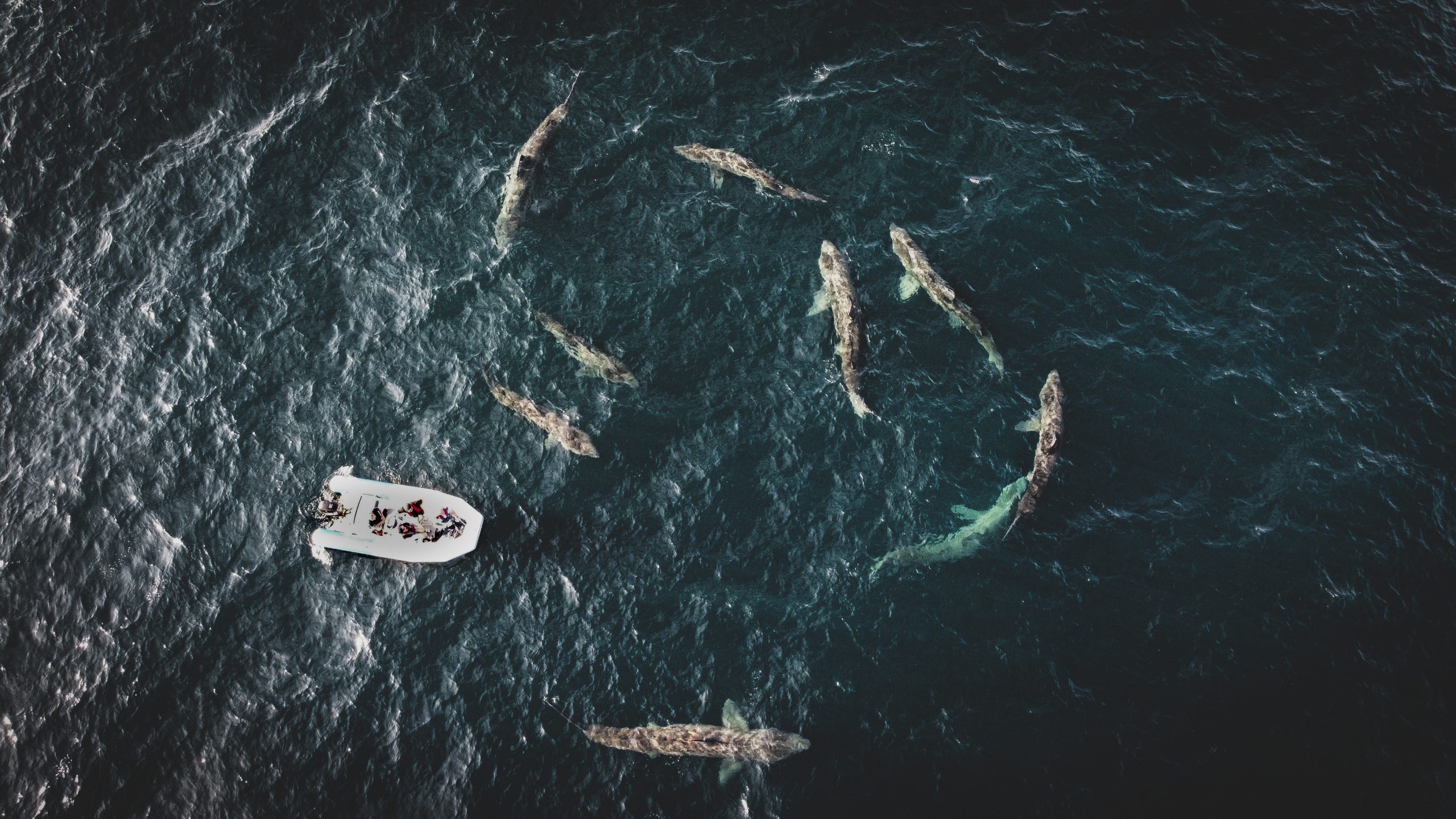In Ireland, we have many graceful creatures; however none have proven to be quite as mysterious as the basking shark.
Basking sharks are the second-largest living shark at nearly 12 metres long, sporting large gaping mouths. Despite their fearsome exterior, they are filter feeders, meaning that they feed through a mechanism similar to a sieve. Basking sharks strain particles in the ocean and can often be seen swimming slowly on the water’s surface in order to filter plankton and small fish through its gills, cleaning the water as it moves. Acting as nature’s “vacuum cleaners”, they remove excess nutrients, preventing damaging environmental consequences like eutrophication, in which excess nutrients in bodies of water result in the overgrowth of dangerous algae. Basking sharks clean everywhere, and are often seen both inshore and offshore in Ireland and throughout the world. When these mysterious creatures are seen, they tend to shy away from boats and human contact.
While these sharks are found on all coasts, they have a great historical relevance to coastal communities in Ireland including Donegal, Galway and Mayo. Basking sharks were often seen in Irish coastal waters, gathering in large numbers to feed on plankton. However this makes them vulnerable to human activity, and they were hunted for their livers, which contain high amounts of oil. Historical records show that many shark fisheries were built across the west coast of Ireland, with the basking sharks undergoing intense periods of target fishing. At its peak in the 1950s, one fishery caught 9,000 basking sharks in a decade.
This intense target fishing resulted in a massive population decline between the years 1946–2017. Sadly, the population has never quite recovered from this tragedy. Today, the International Union for Conservation of Nature (IUCN) lists the basking shark as an endangered species, noting that the population trend is still negative despite the numerous protective measures put in place to prevent the exploitation of these sharks. There are currently no population estimates for basking sharks in Ireland, though some research suggests that the country hosts 10-20% of the global population.
“Despite the high risk of extinction in the wild, it was legal to fish for basking sharks in Irish waters until 2001.”
Despite the high risk of extinction in the wild, it was legal to fish for basking sharks in Irish waters until 2001, and only in 2006 was it prohibited in all EU waters. Many governments across the world have implemented various environmental and fishing policies to protect these sharks from harm, including the UK, Canada and the United States.
With the historical relevance and habitat that Ireland shares with basking sharks, it is all the more surprising that Ireland is one of the few remaining nations in the northeast Atlantic that has never provided domestic legal protection for this species. According to the Irish Basking Shark Group (ISBG) — a collection of research studies and research groups based in Ireland — the basking shark is currently not listed as a protected or restricted fish species under national marine or conservation legislation. While there are policies in place to prevent the active hunting and landing of basking sharks, the main threats to these animals, like countless other marine creatures, are ship collisions, harassment, and entanglement from abandoned or untagged fishing gear. With increasing amounts of foreign fishing gear left in the ocean, these filter feeders are not only at risk for getting entangled in these pieces of equipment, but they are also vulnerable to consuming microplastics in the ocean which could have a severe biological impact.
In May 2021, social democrat TD and former marine biologist Jennifer Whitmore proposed a bill to the Dáil asking to amend the 1974 Wildlife Act to include basking sharks. As of today, in Irish waters anyone can disturb, approach and harm these sharks without consequences. This proposed bill was followed by an open letter written by scientists and conservation organisations, calling for action from the Irish government to enact legal protection of basking sharks.
“This letter is written on the basis of emerging scientific evidence that indicates Irish territorial waters host a large proportion of the global population and are among some of the most important waters internationally for the species.” The letter states, “We ask that Ireland as a modern and responsible society champion the plight of endangered migratory marine species and provide a legal code of conduct to manage human interaction with these magnificent creatures when they are in our waters and on our watch.”
The petition passed to Minister of State Malcolm Noonan, who reacted positively and in turn stated that he “looks forward to collaborating with Jennifer and the campaign groups on this really important measure to afford protection to basking sharks.”
“There remains a critical need to protect the habitat of the basking shark.”
Should the bill to amend the Wildlife Act be passed, basking sharks would be protected against harassment. However, this would not and should not be the end of advocating for these sharks. There remains a critical need to protect the habitat of the basking shark. The threats which endanger the basking shark, such as ship strikes and abandoned fishing gear, can be fought against by implementing new policies such as limiting boat speeds in the area and requiring all fishing gear to be tagged.
The ISBG states that while protecting basking sharks is an important goal, they “firmly believe that adequate protection for the marine environment can only be achieved through a transparent process of stakeholder involvement.” The basking shark is a wonderful creature that should be protected, and to do so includes protecting the marine environment they inhabit.
The basking shark, while being a global citizen, has made its home in Ireland. It is the job of those in government to protect these creatures, not just because they have an important role in our ecosystems, but because of their unique and wonderful ties to Irish culture and heritage.






